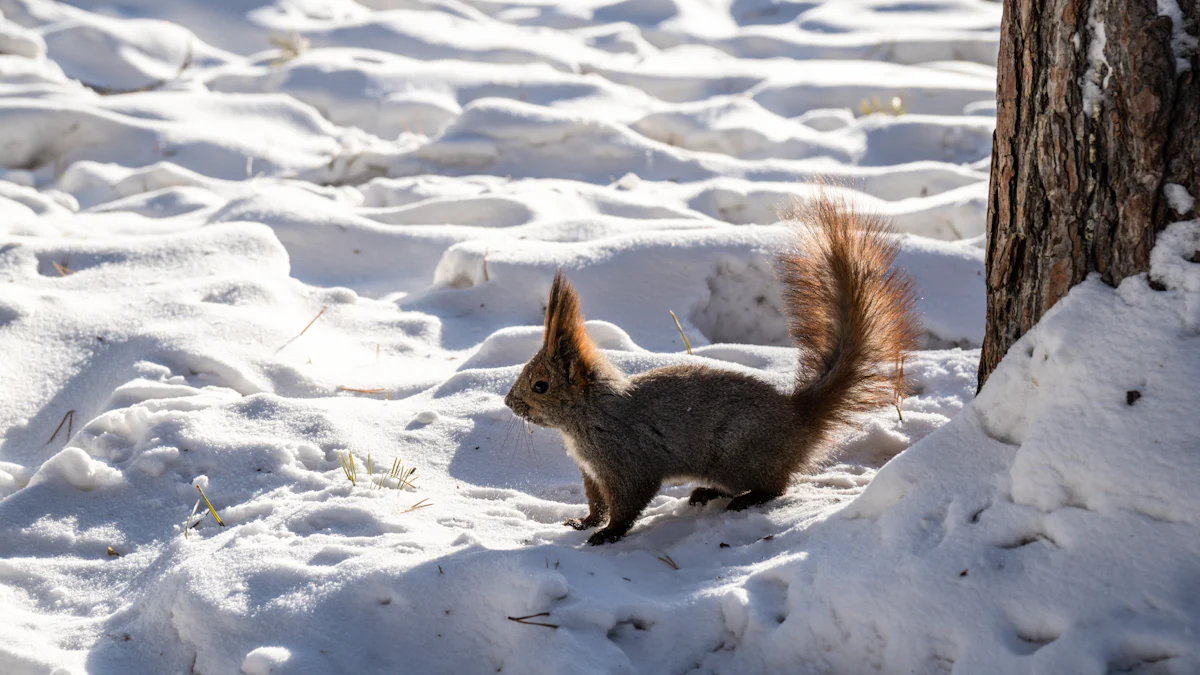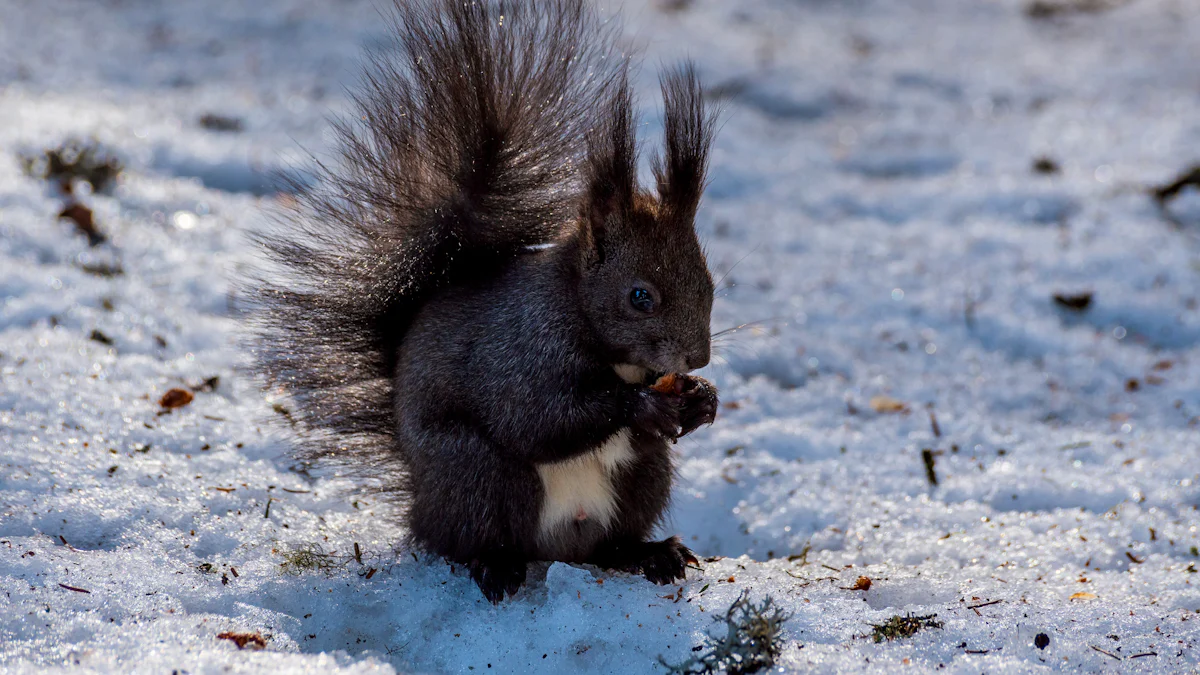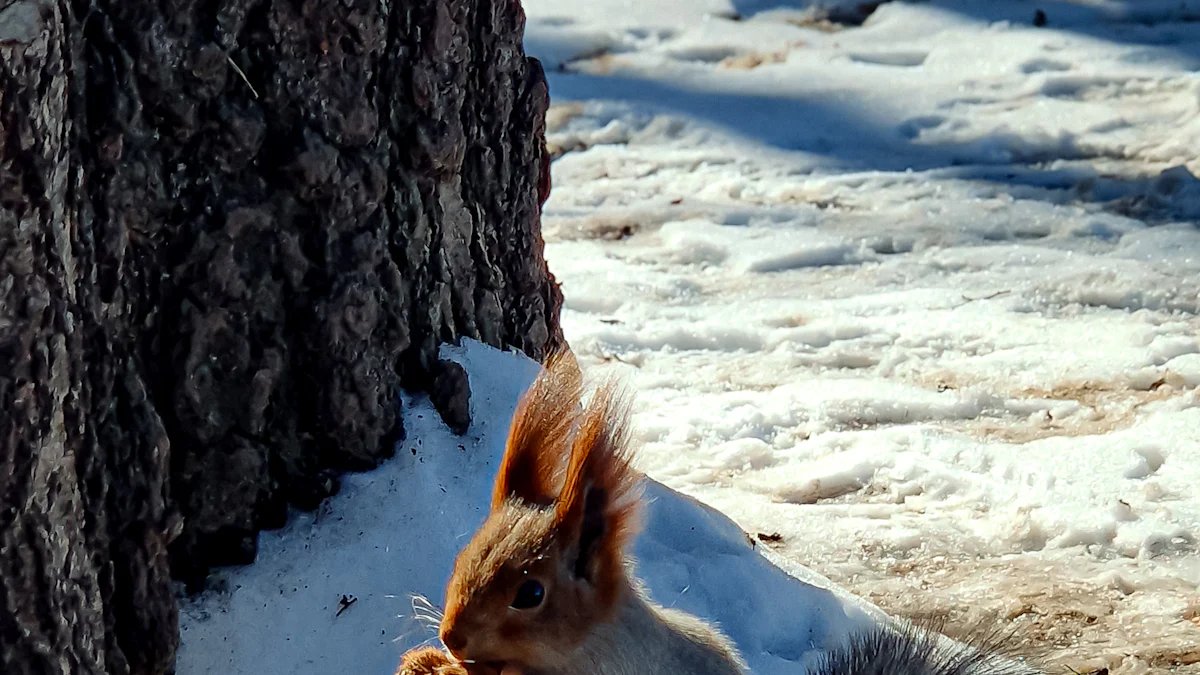
Winter can be tough for squirrels, but they’re resourceful creatures. You might see them munching on nuts, seeds, or even squirrels mealworms. Mealworms are packed with protein and healthy fats, giving squirrels the energy they need to stay active. While nutritious, mealworms shouldn’t be their only food to keep their diet balanced.
Key Takeaways
- Squirrels eat nuts, seeds, fruits, and protein like mealworms. Give them foods like walnuts and sunflower seeds for energy.
- Squirrels hide food in smart ways, like scatter hoarding or larder hoarding, to save food for winter. You can help by using a squirrel feeder with healthy food.
- Do not give squirrels harmful foods like chocolate or junk snacks. Use natural, unsalted foods to keep them healthy in winter.
Squirrels’ Winter Diet

Nuts and Seeds
When it comes to winter, squirrels rely heavily on nuts and seeds to stay energized. These foods are like nature’s power bars, packed with proteins, fats, and essential nutrients. You’ve probably seen squirrels burying acorns in the fall—those hidden treasures become their lifeline during the colder months. Some of their favorite nuts include:
- Walnuts
- Acorns
- Hazelnuts
- Almonds
- Pine nuts
- Pecans
- Beech nuts
Seeds are another staple in their diet. Sunflower seeds, pumpkin seeds, and safflower seeds are all on the menu. These tiny snacks are full of healthy fats and fiber, helping squirrels maintain their energy levels when food is scarce.
Fruits and Vegetables
Fresh fruits and vegetables might not seem like winter foods, but they’re a vital part of a squirrel’s diet. These provide essential vitamins, antioxidants, and fiber, which keep their digestive systems healthy. If you want to help squirrels in your area, consider offering small amounts of apples, carrots, or leafy greens. Just make sure the food is fresh and free from harmful chemicals.
Protein Sources, Including Squirrels Mealworms
Protein is crucial for squirrels, especially in winter when they need extra energy to stay warm. While nuts and seeds provide some protein, squirrels mealworms are an excellent addition to their diet. Mealworms are rich in protein and healthy fats, making them a perfect snack during harsh conditions. They’re especially helpful when other food sources are limited. You might even spot squirrels munching on insects or small animals to meet their protein needs.
If you’re thinking about feeding squirrels mealworms, dried mealworms are a great option. They’re natural, nutritious, and easy to store. Plus, they’re not just for squirrels—birds and reptiles love them too!
How Squirrels Adapt to Winter
Food Storage and Hoarding
Squirrels are master planners when it comes to winter survival. They spend the fall months gathering food and storing it for the colder days ahead. You’ve probably seen them burying nuts and seeds in your yard or local park. This behavior, called food caching, ensures they have a steady supply of food when resources are scarce.
Squirrels use two main strategies for food storage. Scatter hoarding involves burying individual nuts and seeds in multiple locations. This method reduces the risk of losing all their food if one spot is discovered by another animal. On the other hand, larder hoarding means storing a large amount of food in one place, like a tree cavity or underground burrow. Some squirrels even create a midden, a central storage area that multiple squirrels can share.
Their sharp memory helps them locate these hidden treasures. They rely on spatial memory and environmental cues, like landmarks, to find their caches. Sometimes, they even pretend to bury food to trick potential thieves.
Foraging Behavior in Snow
Winter doesn’t stop squirrels from searching for food. Even with snow covering the ground, they use their strong sense of smell and memory to locate buried nuts. You might see them digging through the snow, sniffing out their hidden snacks.
Snowy conditions can make foraging tricky. Deep snow or icy layers can slow them down, and wind chill can lower their body temperature. To cope, squirrels grow thicker fur and seek shelter when the weather gets too harsh. Predators also pose a bigger threat in winter, so squirrels must stay alert while foraging.
Energy Conservation Strategies
Squirrels are experts at conserving energy during winter. Their bodies undergo changes to help them survive the cold months. For example, their metabolism slows down, allowing them to use stored energy more efficiently. They also rely on ketone bodies, a type of energy source, to keep going when food is scarce.
You’ll notice squirrels being less active during winter. This isn’t just because of the cold. By limiting their movements, they save energy and reduce the risk of exposure to predators. They spend more time in their nests, staying warm and resting.
If you’re thinking about helping squirrels this winter, consider offering them nutritious foods like dried mealworms. These are rich in protein and easy to store, making them a great addition to their diet.
Supporting Squirrels in Winter

Providing Nutritious Foods
You can make a big difference for squirrels during winter by offering them the right foods. Nuts are their favorite, especially when they’re still in their shells. Walnuts, acorns, hazelnuts, and pecans are excellent choices. These provide the fats and nutrients squirrels need to stay warm and active. Birdseed, like black oil sunflower seeds, is another great option. It’s packed with energy and easy for squirrels to eat.
If you want to go the extra mile, consider adding squirrels mealworms to their diet. Mealworms are natural, rich in protein, and perfect for giving squirrels an energy boost during harsh weather. Dried mealworms are easy to store and can also attract birds and other wildlife to your yard.
Setting Up Squirrel Feeders
A squirrel feeder can make feeding easier and more fun for you and the squirrels. Look for feeders designed to handle their cleverness. Some feeders have weight-activated mechanisms to keep squirrels from stealing all the food. Others use chew-proof materials to prevent damage. You can also find feeders with cages that let birds eat while keeping squirrels out.
Place the feeder in a safe spot, away from predators and busy roads. Keep it stocked with nutritious foods like nuts, seeds, and dried mealworms. This setup not only helps squirrels but also creates a lively backyard full of wildlife.
Avoiding Harmful Foods
Not all foods are safe for squirrels. Some can harm their health, so it’s important to know what to avoid. Chocolate is toxic and can cause serious health problems. Avocado skin and seeds, onions, and garlic are also dangerous. Processed foods, like chips and candy, are high in unhealthy fats and sugar, which can lead to weight gain and dental issues.
Stick to natural foods and avoid anything with added salt or sugar. Even nuts should be unsalted to prevent dehydration and kidney problems. By choosing the right foods, you’ll help squirrels stay healthy and thrive during winter.
Squirrels are incredible survivors during winter. They rely on a mix of nuts, seeds, fruits, vegetables, and protein sources like mealworms to stay nourished. Their clever food caching strategies, like scatter hoarding and larder hoarding, ensure they have enough to eat. When caches run low, they adapt by eating bark, tree buds, or even insects.
You can help squirrels thrive by offering safe, nutritious foods. Dried mealworms are a fantastic choice—they’re rich in protein and natural energy. Plus, they’re not just for squirrels! Birds, reptiles, and other animals love them too. At DpatQueen, we specialize in high-quality dried mealworms at competitive prices, perfect for supporting wildlife in your backyard.
FAQ
What should you avoid feeding squirrels in winter?
Avoid chocolate, avocado skin, onions, garlic, and processed foods. These can harm squirrels. Stick to natural, unsalted nuts, seeds, and fresh fruits or vegetables.
Tip: Always check food for added salt or sugar before offering it to squirrels.
Are dried mealworms safe for squirrels?
Yes! Dried mealworms are natural and rich in protein. They’re perfect for squirrels, birds, and reptiles. Plus, they’re easy to store and provide a great energy boost.
Note: DpatQueen offers high-quality dried mealworms at competitive prices. They’re ideal for supporting wildlife in your backyard!
Can you feed squirrels every day?
You can, but don’t overfeed. Offer small amounts of nuts, seeds, or mealworms. This helps squirrels without making them dependent on your food supply.
🐿️ Fun Fact: Squirrels still forage even when you provide food. It’s part of their natural behavior!


